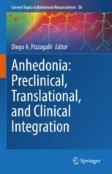Search
Search Results
-
Reduced Reward Processing in Schizophrenia: A Comprehensive EEG Event-Related Oscillation Study
It is well known that abnormal reward processing is a characteristic feature of various psychopathologies including schizophrenia (SZ). Reduced...

-
Higher body weight-dependent neural activation during reward processing
Obesity is associated with alterations in brain structure and function, particularly in areas related to reward processing. Although brain structural...

-
Hazardous or harmful alcohol use and reward processing in people with HIV
The intersecting epidemics of HIV and hazardous or harmful alcohol use (HAU) can have significant detrimental consequences. Both HIV and HAU have...

-
Reward prediction error neurons implement an efficient code for reward
We use efficient coding principles borrowed from sensory neuroscience to derive the optimal neural population to encode a reward distribution. We...

-
Consensus Paper: Cerebellum and Reward
Cerebellum is a key-structure for the modulation of motor, cognitive, social and affective functions, contributing to automatic behaviours through...

-
Light Cannabis Use and the Adolescent Brain: An 8-years Longitudinal Assessment of Mental Health, Cognition, and Reward Processing
RationaleFor decades, cannabis has been the most widely used illicit substance in the world, particularly among youth. Research suggests that mental...

-
Task demand modulates the effects of reward learning on emotional stimuli
The current study used event-related potentials (ERPs) to examine the ability of task demand in modulating the effect of reward association on the...

-
Amphetamine alters an EEG marker of reward processing in humans and mice
The bench-to-bedside development of pro-cognitive therapeutics for psychiatric disorders has been mired by translational failures. This is, in part,...

-
Reward processing in trichotillomania and skin picking disorder
Trichotillomania (hair pulling disorder) and skin picking disorder are common and often debilitating mental health conditions, grouped under the...

-
Lack of effect of methamphetamine on reward-related brain activity in healthy adults
IntroductionStimulant drugs are thought to alter processing of rewarding stimuli. However, the mechanisms by which they do this are not fully...

-
Cannabinoids, reward processing, and psychosis
BackgroundEvidence suggests that an overlap exists between the neurobiology of psychotic disorders and the effects of cannabinoids on neurocognitive...

-
The effect of reward expectation on working memory of emotional faces under different levels of cognitive load: an ERP study
Using event-related potentials (ERPs), this study examined the impact of reward expectations on working memory of emotional faces under different...

-
Lateral entorhinal cortex subpopulations represent experiential epochs surrounding reward
During goal-directed navigation, ‘what’ information, describing the experiences occurring in periods surrounding a reward, can be combined with...

-
Electrophysiological Correlates of Reward Anticipation in Subjects with Schizophrenia: An ERP Microstate Study
The current study aimed to investigate alterations of event-related potentials (ERPs) microstate during reward anticipation in subjects with...

-
Networks Associated with Reward
This chapter describes brain networks related to reward processing. We will first consider the reward regions identified by decades of preclinical...
-
Δ9-THC reduces reward-related brain activity in healthy adults
RationaleGreater availability of cannabis in the USA has raised concerns about adverse effects of the drug, including possible amotivational states....

-
The Role of the Cerebellum in Learning to Predict Reward: Evidence from Cerebellar Ataxia
Recent findings in animals have challenged the traditional view of the cerebellum solely as the site of motor control, suggesting that the cerebellum...

-
mTORC1-mediated acquisition of reward-related representations by hippocampal somatostatin interneurons
Plasticity of principal cells and inhibitory interneurons underlies hippocampal memory. Bidirectional modulation of somatostatin cell mTORC1...

-
An experimental medicine study of the effects of simvastatin on emotional processing, reward learning, verbal memory, and inflammation in healthy volunteers
RationaleClinical studies suggest that the highly lipophilic, anti-inflammatory molecule, simvastatin, might be an ideal candidate for drug...

-
Pleasure, Reward Value, Prediction Error and Anhedonia
In order to develop effective treatments for anhedonia we need to understand its underlying neurobiological mechanisms. Anhedonia is conceptually...
